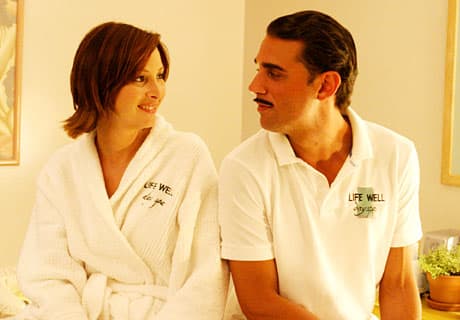Happy Endings is the greatest Paul Thomas Anderson movie Anderson never made. Like much of the work of that enfant terrible, the film feels the pain of a group of disparate individuals in the throes of personal turmoil: the grown-up woman (Lisa Kudrow) being blackmailed with information about the son she gave up to a gay man (Steve Coogan) simmering with jealousy over a lesbian friend's baby and the girl of no fixed address (Maggie Gyllenhaal) who manipulates a young gay man (Jason Ritter) and his lonely father (Tom Arnold).
But where Anderson would be content to wallow in the suffering of his collection of losers, writer/director Don Roos is far more advanced, drawing some sharp character sketches and offering some genuine observations beyond the Andersonian dictum that "mean people suck." To be sure, there's some facile irony to Roos's approach, with some inter-titles that are alternately right on the money and maddeningly glib. And he can't resist a few cheap laughs that don't feel connected to the bittersweet drama at its core. But the film is still a quantum leap from Roos's debut, The Opposite of Sex, experimenting with jittery camerawork that values the dark undercurrents over the (admittedly hilarious) gags.
On top of everything else, it manages to find several definitions of the title phenomenon and manages to wrap up hopefully without compromising its integrity. If the film winds up being sitcom Renoir, that's still far more than most movies aspire to, and if you peel away the defensive joking you'll be immensely rewarded by what lies beneath, which is more than I can say for the overrated Anderson. (Maple)
But where Anderson would be content to wallow in the suffering of his collection of losers, writer/director Don Roos is far more advanced, drawing some sharp character sketches and offering some genuine observations beyond the Andersonian dictum that "mean people suck." To be sure, there's some facile irony to Roos's approach, with some inter-titles that are alternately right on the money and maddeningly glib. And he can't resist a few cheap laughs that don't feel connected to the bittersweet drama at its core. But the film is still a quantum leap from Roos's debut, The Opposite of Sex, experimenting with jittery camerawork that values the dark undercurrents over the (admittedly hilarious) gags.
On top of everything else, it manages to find several definitions of the title phenomenon and manages to wrap up hopefully without compromising its integrity. If the film winds up being sitcom Renoir, that's still far more than most movies aspire to, and if you peel away the defensive joking you'll be immensely rewarded by what lies beneath, which is more than I can say for the overrated Anderson. (Maple)
